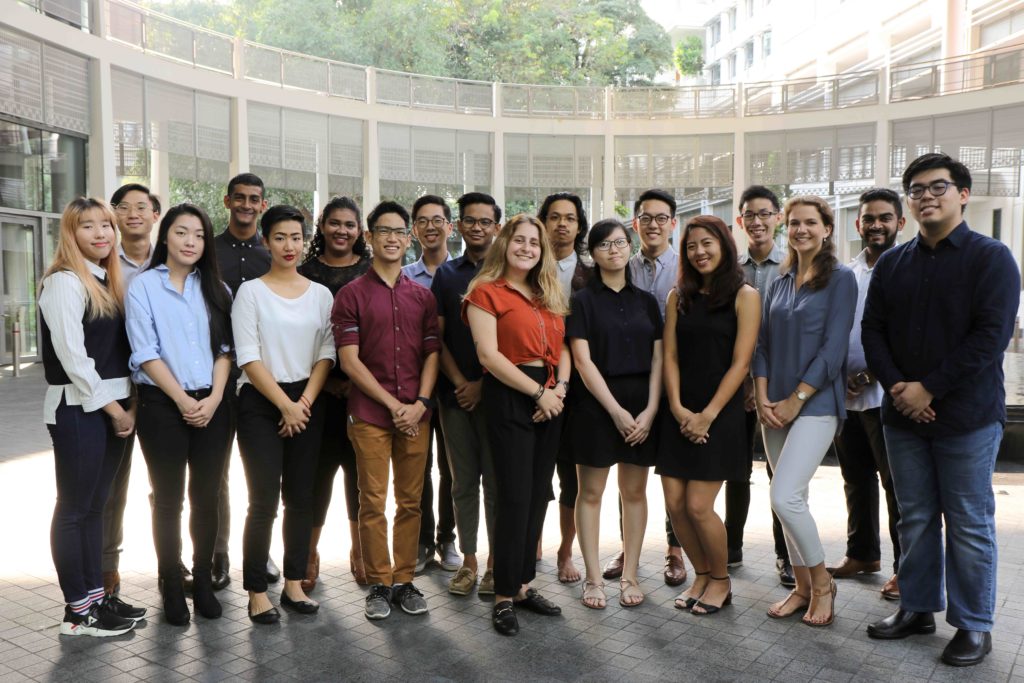The 5th Yale-NUS Student Government takes office; charts new direction
 Image provided by Yale-NUS Student Government.
Image provided by Yale-NUS Student Government.
The fifth Yale-NUS Student Government was officially sworn in on 13 September 2018. Since taking office, it has made structural reforms and expanded its scope to include both new and existing priorities in areas like student life, alumni affairs, diversity and sustainability.
The Student Government, which represents the student body for the 2018/2019 academic year, consists of 25 members and is made up of the Student Council, the brand-new Senate and the Judiciary. Scott Lee Chua (Class of 2019), last year’s Vice President, took over from Brandon Lee (Class of 2020) as President.
Jolene Lum (Class of 2019) and Agatha Tan (Class of 2020) will hold the appointments of Vice President of Internal Administration (IA) and Vice President of Student Activities respectively.
Jolene’s role overseeing IA is a new one, created to focus on institutional affairs, student life logistics and alumni affairs. Some of its current alumni projects include building a first-generation alumni network and improving alumni outreach and engagement with current students.
“The portfolio is completely new,” Jolene said. “Apart from finance, which makes up a big part of our duties, I set up IA so that it would help pass on institutional knowledge to future students. One project I took on that would help with that is putting together a handbook for government affairs and history.” Her team has also set out to provide extra services like 24-hour printing top-ups, merchandising, and shuttle buses to the airport during move-in and move-out periods.
In contrast to previous years, the fifth Yale-NUS Student Government has also created the Senate, which is currently made up of representatives from each class. “It is essentially the decision-making body and has the power to direct the actions, policies and visions of Student Government as a whole,” said Jiang Haolie (Class of 2021), Speaker of the Student Government and Chair of the Senate.
As the Chair, Haolie’s priority had been to operationalise and set the tone of the Senate body, as well as expand it to include student representatives of various identity and advocacy groups—such as those of minority ethnicities, the LGBTQ+ community, mental health and environmental groups. The Senate is part of the Student Government’s hope to reconceptualise itself as a broad coalition for student activism and representation, rather than just act as a bridge between the student body and college administration.
“This increases the relevance and strength of the Student Government as a body by which student administration relations are facilitated, enabling the voice of the student body to be more powerful,” Haolie said.
The Student Government has also decided to encompass certain specific areas within its focus this academic year. One such area is diversity and inclusion, led by Director of Diversity and Inclusion Kristian-Marc James Paul (Class of 2019).
He made it clear that inclusivity extends beyond protecting students from marginalisation. He said, “It’s also about creating a community where differences are accepted and appreciated. I mean approaching difference with empathy and being open to learn about differences.”
Kristian has led several initiatives to make campus spaces more inclusive by challenging existing structures and mechanics within the College. For example, his team has made language suggestions in the Centre for Teaching & Learning sample syllabus template. They reworked one section to include language to acknowledge physical, psychiatric or learning conditions, as well as an awareness of how much time a student takes during class discussions.
“The syllabus for a class, to me, is an important starting point for any class and can really set the tone for the semester,” Kristian said.
In his State of College Address during the first Senate meeting, Scott said that “the Student Government will look at sustainability as its preferred course. There will be no more disposable ‘anythings.’” He added that the group had pledged not to use external vendors and adopt a sustainable event checklist crafted by the Student Committee for Sustainability.
Members of this year’s Student Government took on their roles for a variety of reasons. Kristian-Marc, who is in his final year, said he was motivated to participate because previous governments often did not have fourth-year voices in their team. “I think there is value in my experience, in having been here for quite a while now,” he said, “so my hope for joining was to show juniors and seniors that they are the ones who should be leading the Student Government, that it is indeed possible to manage senior year and the workload of Student Government.”
Secretary Nicole Quah (Class of 2021), said her personal experience as a first-year student inspired her sign up. “I was really confused about what was going on in school and never felt like there was someone from the Student Government that I could talk to. So this year I decided to run for Secretary, [so that I could help] maintain a sustainable and effective communication platform between Student Government and student body.”
Jolene, a strong believer of public service, said she was compelled to take on her current role because of the general apathy around joining the Student Government.
“I hope to lead by example and show other underclassmen that someone does have to do the dirty work, and therein lies satisfaction if you are willing to pursue it,” she said. “Student Government at Yale-NUS is an enterprise that takes a lot of effort to sustain.”





